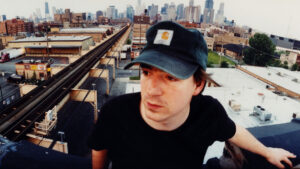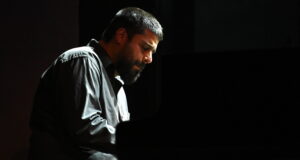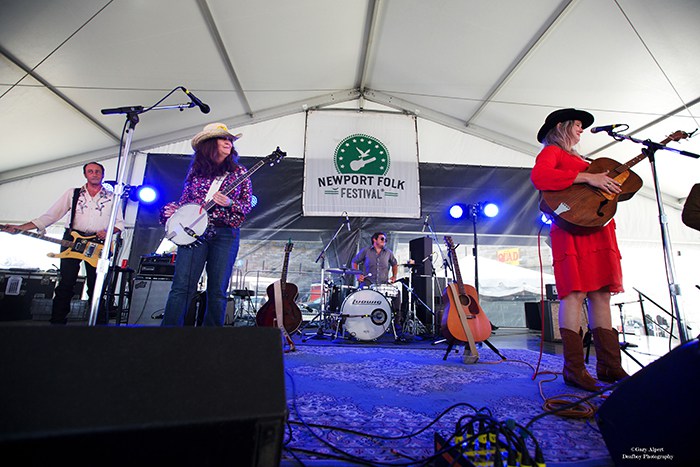
Godinu dana pre nego što su Uncle Tupelo objavili “No Depression” i doveli “Amerikanu” na prag mainstreama, Freakwater su svetu predstavile svoj debi album, nazvan kao i bend (freakwater je isto što i moonshine, popularna brlja)… I pored “alternative rock/punk rock” pedigrea, prijateljice Dženet i Ketrin (Janet Bean, Catherine Irwin) snimile su te 1989. album sa “starinskom muzikom”, usput mešale originalne kantri pesme i obrade tradicionala, sa vokalnim harmonijama dva glasa toliko različita da niko ne bi ni pokušao da ih spoji i sa krajnjim rezultatom koja je podsećao na muziku kakvu su nekada pravili The Carter Family. Skoro trideset godina kasnije, Freakwater i dalje prave istu takvu, starinsku muziku, samo se svet oko njih drastično promenio. Može da se se kaže da je to blugras, bluz, folk, kantri… ali može da se opiše to što rade i bez tih reči: njihova muzika to je magija koja nastaje kada se njihovi glasovi pomešaju, a instrumenti počnu da prate tu čaroliju. Neko bi rekao da je to “Appalachian soul”. One same kažu da je to “Freakwater”. Ali ono što je bitno: jednom pankerke – uvek pankerke i ta njihova angažovanost, direktnost, hrabrost i spremnost da se suprostave svakoj nepravdi, čini da njihova karijera bude više rokenrol misija, nego jurnjava za tiražima i velikim novcem. Nema na ovom svetu više grupa kao što je Freakwater i nije čudo da su njihovi veliki fanovi Howe Gelb, Neko Case, Jay Farrar, Lucinda Williams, Emmylou Harris…
Posle 11 godina Freakwater dolaze na prvu evropsku turneju, promovišu osmi studijski album, “Scheherazade”, prvi posle deset godina i imaju nešto važno da vam kažu. Dođite u utorak u Elektropionir da čujete šta! Pred koncert u Beogradu za Pop Depresiju priča Dženet Bin.
PD: Ima li nešto novo da se kaže ili je sve ispričano u “Hiljadu i jednoj noći”?
Dženet Bin (Janet Bean): Priče koje se bave moralnim dilemama nikad ne zastarevaju, zato što je težnja da se razume ljudska priroda neprestana. Sve dobre priče imaju taj kvalitet, da nas prosvetle, da doprinesu razumevanju. Šeherezadina misija je da zaustavi besmislena Šahrajarova ubijanja ‘svojih’ žena, što se dešava svkog dana. On ih ubija jer se plaši da će ga prevariti sa drugim muškarcima. Šeherezada je heroina. Ona rizikuje sopstveni život da bi omogućila promenu. Na kraju uspeva da pridobije Šahrajara i prekine njegove ubilačke porive.
PD: Šta je to što ste htele da istaknete albumom “Scheherazade”?
JB: Mnoge pesme na albumu bave se temom morala, ljudskog dostojanstva i nehumanosti. “What The People Want” bavi se tekućom svetskom epidemijom nasilja nad ženama. Volim kad Katarina u pesmi pita “čije si ti dete?”, zahtevajući od nasilnika da zamisle sebe kao dete neke od tih žena koje zlostavljaju. Traži od njih da još jednom razmisle pre nego nekoga siluju, kamenuju, izbodu, izvređaju kao majku, kao ljudsko biće. “Memory Vendor” govori o izraelskoj okupaciji Zapadne obale i Gaze. U njoj zahtevamo da napadač zastane na trenutak i posmatra sebe očima žrtve. Ako nismo u stanju da osetimo empatiju i posmatramo sebe isto kao i drugog, jednostavno stvaramo još patnje, još neprijatelja, još smrti i nasilja. Izraz “Memory Vendor” (Prodavac sećanja) je uzet iz pesme “U njenom odsustvu, stvorio sam njenu sliku” palestinskog pesnika Mahmuta Darviša. Naše sećanje o stradanju, kolektivno i pojedinačno, postaje deo našeg genetskog koda, i zato se surovost čoveka prema drugom čoveku nastavlja.
Ta pesma kojom počinje album – “What the people want” – je na više načina prava pank-rok himna, pesma “veća od života”, koja se bavi bitkama koje više niko ne želi da bije. Može li muzika danas bilo šta da promeni?
JB: O da, umetnost danas može da menja stvari – pozitivno i negativno. To može da bude fotografija, televizijska serija, slika ili pesma. Upravo ovih dana u Čikagu je u toku izložba slikara Kerija Džejmsa Maršala. On je crnac i u svojim radovima on podstiče posmatrača da osvesti to kako nesvesno prihvatamo rasistički diskurs. Njegovi radovi stavljaju crnce u poziciju moći, potpuno oslobođene belačkih kulturoloških ograničenja. To je jedna od najmoćnijih izložbi koju sam ikad videla. Promenila me je. Muzika ima moć da podstakne revolucije. Muzika takođe ima moć da pošalje mlade na bojno polje o kome ne znaju ništa osim što im je rečeno da im je to dužnost. Nikad ne treba da potcenimo snagu svog umetničkog truda.
Da li se tvoja uloga kao liderke benda promenila tokom ove tri decenije? Šta činiš da ostaneš normalna tokom dugih turneja? Ova je valjda jedna od najdužih…
JB: Sviram još i bubnjeve u bendu Eleventh Dream Day. Tamo sam još duže nego u Freakwater. Nedavno me neka devojka pitala posle koncerta kako podnosim pritisak na mestu ženskog bubnjara. Rekla sam joj da ja kao i većina žena preuzima uloge koje nisu uobičajene za naš pol, pa smo predmet seksističkih primedbi i ponašanja, ali u suštini, ja nikad nisam procenjivala sebe na osnovu nekog drugog. Nikad nisam razmišljala u stilu – ma nisam dobra u tome kao muškarac… Jednostavno sam to smatrala mojim pristupom, ni muškim ni ženskim. Uvek je bio i uvek će biti samo moj način izražavanja. Kako sam starija, mislim da sam se dosta oslobodila kao muzičarka i izvođač. To je jedna od prednosti zrelosti. Osećam manje ograničenja. Više me nije briga da li izgledam kao poremećena ludača i nije me više sramota zbog toga.
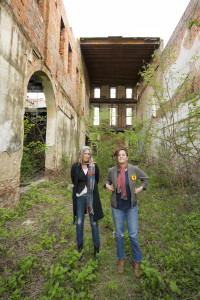
Sa Freakwater, da li više voliš rad u studiju ili koncerte?
JB: Uživam kad sviramo uživo. Tad imam osećaj da sam na nekom opasnom zadatku bez mogućnosti za popravni. Volim da isprobavam nove stvari sa glasom što dodaje tom osećaju opasnosti. Tu je i tenzija između članova benda koja je mnogo prisutnija na koncertu nego u studiju. Ja sam uvek za uzbuđenje tako da često dajem sve od sebe da se to uzbuđenje i dogodi.
Da li možeš da izabereš 5 pesama Freakwater, od prvog albuma do danas, za kompilaciju “Freakwater za početnike”?
JB: Hm…. naša najtraženija pesma je “Old Drunk Friend” sa albuma “Feels Like The Third Time”. Izgleda da svako ima nekog takvog posebnog prijatelja, tragičara, tako da bi to bila prva. Onda može vesela “Waitress Song” sa albuma “Old Paint”. Ona govori o univerzalnim temama koje čine opus našeg benda. Zatim bih izdvojila našu obradu zaista perverzne pesme Konveja Tvitija “You’ve Never Been This Far Before“, jer dobro ilustruje naš smisao za humor i feministički pristup. Kao sledeću bih izabrala “Cloak of Frogs” sa albuma “End Time”. To je klasična priča o neverstvu. Ona dobro prikazuje naš avanturistički duh kada je zvuk u pitanju i zahvaljujući njoj nije nas uvek lako smestiti u samo jedan žanr. Pošto je jedna pesma bila obrada, dodaću još dve! “Forgettable Song” je bila prilično važna za utiranje puta onome što je danas Freakwater. To je Katarinina pesma, govori o sjebanoj vezi i njenoj komplikovanosti. Sviramo je na ovoj turneji i pokazala se bolja nego ikad. To je jedna od onih pesama čija magija leži u dinamici – u pauzama između redova. I na kraju, staviću “Falls of Sleep” sa naše nove ploče “Scheherezade”. To je velika, dramatična pesma o nesanici i o onom vremenu pre svitanja kada zuriš u plafon iz kreveta razmišljajući o proživljenom, o onom za čim žališ, shvatajući da je sve to deo života.
Koji album pustiš sebi kad ne želiš da pričaš ni sa kim?
JB: Imam dva. “Astral Weeks” Vana Morisona i “On the Beach” Nila Janga. “Astral Weeks” ima nekakvu tužnu eleganciju. Zvuči kao jedan od 12 koraka tugovanja. To je remek delo. I svaki put kad pomislim da je Van Morison imao 21 godinu kad ga je snimio potpuno odlepim. “On the Beach” ima taj savršeni nenametljivi kvalitet. To je muzika koju čovek piše sebi u gluvo doba noći. Intimnost tog albuma je očaravajuća. To je najusamljeniji album koji sam ikad čula.
Ko peva bolje u mraku – Gaj Klark ili Tauns Van Zant?
JB: Moram da kažem – Tauns. Bili smo s njim na turneji godinu i nešto pre njegove smrti. Njegovi koncerti su bili poseban doživljaj, ali kupio me je nežnošću koju je pokazao prema mom sinu. Met je tada imao negde 3-4 godine i kao sva mala deca budio se u cik zore. On i ja smo tako svako rano jutro išli u hotelsku salu na doručak, gde je već odavno sam sedeo Tauns. Met i on su se silno zabavljali i meni se prosto srce topilo od radosti dok sam ih gledala. Tauns je, barem iz onog kratkog i neobaveznog vremena koje sam ga poznavala, bio odmeren, beskrajno zabavan, nevaljao, veoma talentovan i strašno progonjen svojim demonima. Verujem da je on za mnoge bio njihov “Old Drunk Friend“.
Janet Bean: Music has the power to fuel revolutions [English version]
Are there new stories to be told or everything is already written in “One Thousand and One Nights”?
Stories that frame a moral dilemma never grow old, for the search to understand human nature is a never ending pursuit. All enduring stories share this quality, the quest to enlighten us, to bring understanding. For Scheherazade her purpose is to put an end to Shahrayar’s senseless deaths of the women he marries on a daily to basis. He puts his wives to death because he fears infidelity. She is a cultural hero. She risks her own life to bring about change. She manages to win over Shahrayar ending his murderous ways.
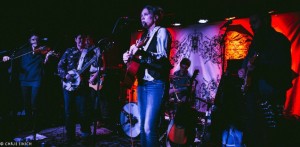 What’s the most important story you told by “Scheherazade”?
What’s the most important story you told by “Scheherazade”?
Many stories behind the songs on this record take on issues of ethics, of human dignity and the inhumanity of man. What the People Want addresses the world wide epidemic of brutality towards women. I love the way Catherine asks “whose baby are you.” For me it feels like she is asking the perpetrators to think of themselves as the children of women. Asking them for a second think to of this person they are raping, stoning, stabbing, demeaning as a mother, their mother, as a human. Memory Vendor speaks to Zionist occupation of the West Bank and Gaza. It asks the perpetrators to step back and look at their behavior from the persepctive of the victim. If we can not find empathy and see ourselves as one and not separate from the “other” we mearly create more suffering, more enemies, more death and more destruction. The phrase Memory Vendor is taken from the poem “In Her Abscence I Created Her Image” by the Palestinian poet Mahmoud Darwish. Our memory, collectively and individually, of suffering enters our DNA, it doesn’t go away and thus man’s inhumanity to man continues.
The opening song “What the People Want” is in so many ways true punk-rock anthem, “bigger that life song”, addresing gender-based violence and fighting battles nobody cares. Can music still change something, today?
Oh yes, I feel all art can bring change either positive or negative. It can be a photograph, a televsion show, a painting, or a song. The master painter Kerry James Marshall has a retrospective up right now in Chicago. He is a black man making images that challenge the viewer to become self-aware of how we unknowingly accept racist narratives. His work places the black man or woman in the position of power, of making their own image free of white cultural restraint. It is one of the most powerful visual art shows I have ever seen. It changed me. Music has the power to fuel revolutions. Music also has the power to send a young person onto a battlefield to kill women and children in war they really know nothing about historically other than they have been told it is there duty. They put their head phones on, turn up the volume of whatever song makes then feel numb and it sets them free. We should never underestimate the power of our artistic endevours.
Has the role of frontwoman changed for you during the last three decades and what do you do to stay sane during long tours? This tour is one of the longest you’ve ever done…
I also play drums in Eleventh Dream Day. I have been in that band even longer than Freakwater. I was asked by a young woman recently after a show how I handled the pressure of being a woman drummer. I told her that I had been, as almost all woman taking on roles not common for our gender, subjected to sexist behaviors and attitudes, but at the core I tried never to judge myself against anyone else. I didn’t think “i’m not as a good as a guy.” I just thought this is my expression, it’s not a man’s expression nor is it essentially a woman’s expression. It was and is, solely MY expression. I think as I have gotten older I have become freer as a musician and performer. It’s one of the perks of getting older. I feel less restraint. I don’t care so much if I look like a deranged lunatic nor do I feel embarrased about.
What is your favourite part of Freakwater – both in studio and live?
I love playing live. There’s a sense of being on a highwire without a net. I love trying new vocal approaches live because it adds a sense of danger. There’s a tension, that I love between the players that is much more present when playing live. I have a little bit of the thrill seeker in me so I am pushing all things I do toward finding that sensation.
Can you choose 5 songs by Freakwater from the very beginning ’til now, to be on a “Freakwater basics” mixtape?
Hum… Our most requested song is “Old Drunk Friend” from Feels Like the Third Time. Everyone seems to have this type of tragic, but special friend, so I would put that on there. Then maybe the upbeat Waitress Song from Old Paint. It speaks to universal themes that form the Freakwater narrative. Then maybe our cover of Conway Twitty’s perverse song “You’ve Never Been this Far Before” , also from Feels Like the Third Time, because I think it illustrates a bit of our sense of humor and feminist drive. Next maybe I would pick “Cloak of Frogs” off of End Time. It’s a classic tale of infidelity and and inner turmoil. It shows some of our adventurous nature sonically and is one of our tunes that keep us from being easily identified by genre. Since my second pick was a cover I’m gonna pick two more! Next I would say “Forgettable Song.” It’s also on Feels Like the Third Time” I think that record was pretty foundational in setting the band on its course. Forgettable Song, a song by Catherine, has a classic broken relationship narrative and a fragility to it. We are playing it on this tour and it’s sounding better than ever. It’s one of those tunes where the magic lies in the dynamics. In the spaces between the lines. And finally I might add “Falls of Sleep” off our new record Scheherazade. It’s a big dramatic song about insomnia and that time before the dawn when you’re staring at the ceiling in bed thinking of your life lived, of regret and it’s integral part of a life lived.
What’s the album you play when you don’t wanna talk to anyone?
I have to pick two. Van Morrison’s “Astral Weeks” and Neil Young’s “On the Beach”. “Astral Weeks” had this woeful elegance. It sounds like one of the 12 steps of grieving to me. It’s a masterpiece. Every time I hear it I think of how Van was maybe 21 when he wrote it and it blows my mind. Neil’s “On the Beach” has this perfect shambling along quality. It’s the music one makes by themselves in the dark of night. Its intimacy is captivating. It’s the loneliest album I’ve ever heard.
Who sings better in the dark – Guy Clark or is it Townes van Zandt?
I must say Townes. We toured with Townes a year or so before his death. His shows were profound, but what stole my heart was his gentleness toward my son. My son was maybe 3 or 4 at the time and like all children he woke at the crack of dawn. He and I would head to the hotel breakfast room where we would always find Townes sitting by himself in an empty breakfast room. Matt, my son and Townes would amuse each other in the most dear way that my heart would weep with joy. Townes was, at least in the short and casual way I knew him graceful, endlessly funny, mischievous, deeply talented and deeply troubled by demons. He was I’m sure to many their dearest “Old Drunk Friend.”

